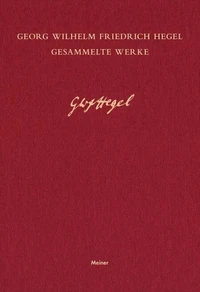Georg Wilhelm Friedrich Hegel's "Science of Logic" stands as a monumental work in the realm of philosophy, intricately exploring the nature and development of thought itself. Employing a dialectical method, Hegel meticulously constructs a framework where concepts evolve through contradictions, ultimately revealing a profound interconnectivity in human reasoning. His literary style is characterized by dense, systematic exposition and a commitment to uncovering the underlying structures of ideas, positioning this text as a cornerstone of German Idealism and a precursor to later existential thought.
Hegel, an influential figure born in 1770, was immersed in the intellectual currents of his time, including Kantian philosophy and the tumultuous socio-political landscape of post-revolutionary Europe. His experiences as a student and teacher, coupled with his engagement in the philosophical debates of his era, significantly shaped his thought processes. Through "Science of Logic, " Hegel aimed to elucidate the mechanistic progression of logical categories, providing a rigorous foundation for subsequent philosophical inquiry and laying the groundwork for metaphysical exploration.
This distinguished text is highly recommended for readers seeking to grasp the intricacies of Hegelian philosophy. It invites scholars, students, and philosophy enthusiasts alike to engage with the dialectical method, enhancing their understanding of not only logic but also the nature of philosophical inquiry itself.
Georg Wilhelm Friedrich Hegel's "Science of Logic" stands as a monumental work in the realm of philosophy, intricately exploring the nature and development of thought itself. Employing a dialectical method, Hegel meticulously constructs a framework where concepts evolve through contradictions, ultimately revealing a profound interconnectivity in human reasoning. His literary style is characterized by dense, systematic exposition and a commitment to uncovering the underlying structures of ideas, positioning this text as a cornerstone of German Idealism and a precursor to later existential thought.
Hegel, an influential figure born in 1770, was immersed in the intellectual currents of his time, including Kantian philosophy and the tumultuous socio-political landscape of post-revolutionary Europe. His experiences as a student and teacher, coupled with his engagement in the philosophical debates of his era, significantly shaped his thought processes. Through "Science of Logic, " Hegel aimed to elucidate the mechanistic progression of logical categories, providing a rigorous foundation for subsequent philosophical inquiry and laying the groundwork for metaphysical exploration.
This distinguished text is highly recommended for readers seeking to grasp the intricacies of Hegelian philosophy. It invites scholars, students, and philosophy enthusiasts alike to engage with the dialectical method, enhancing their understanding of not only logic but also the nature of philosophical inquiry itself.

 , qui est-ce ?
, qui est-ce ?